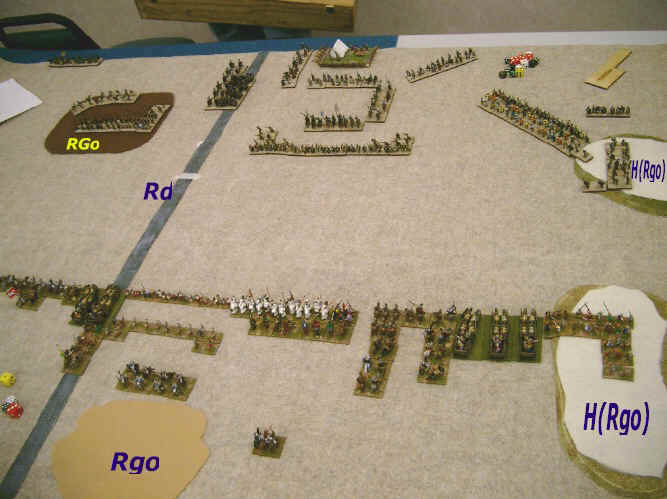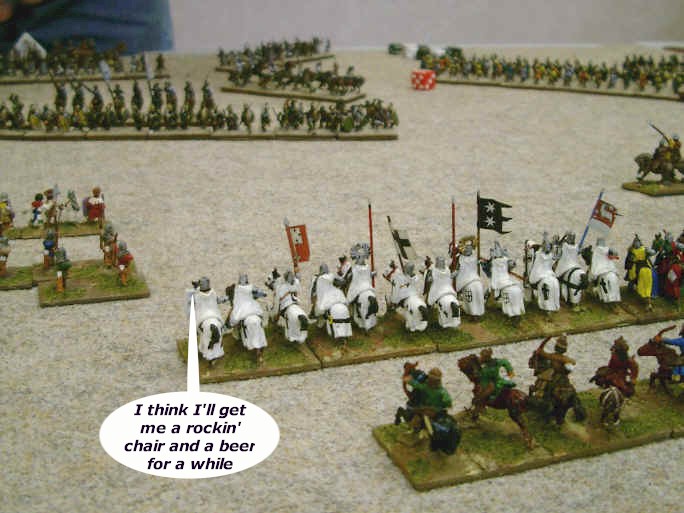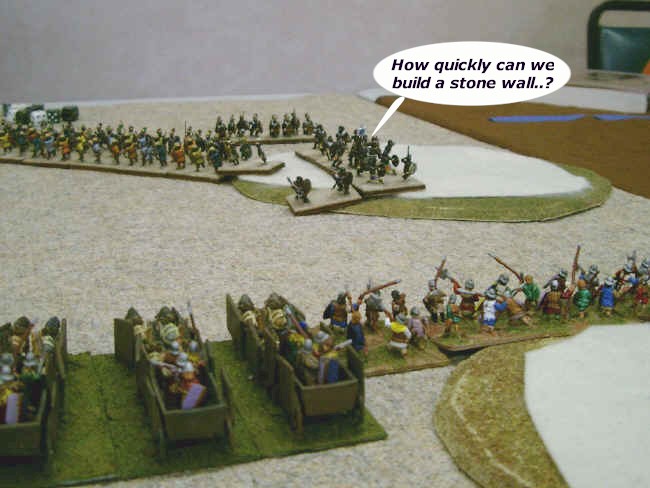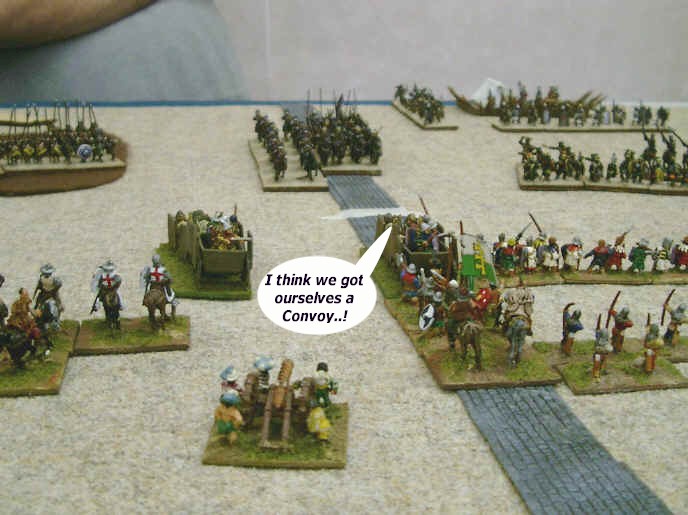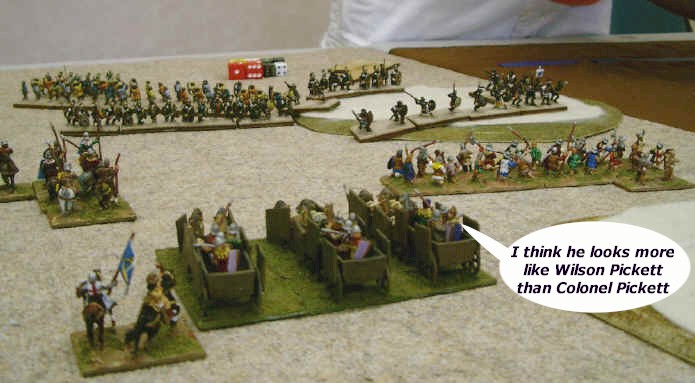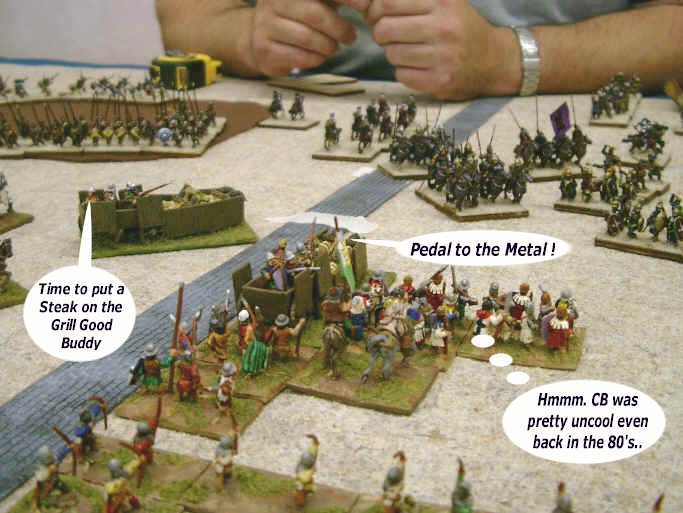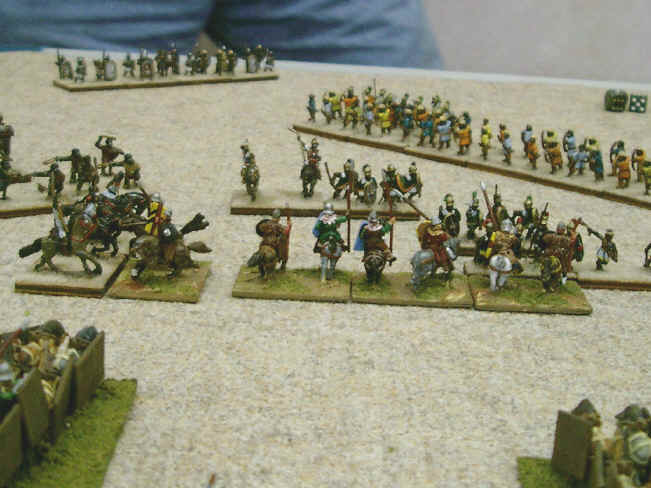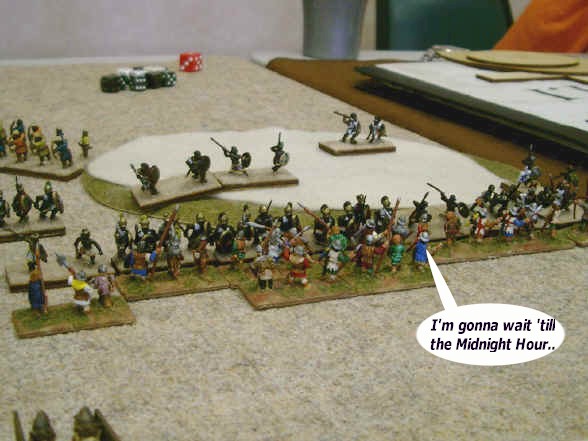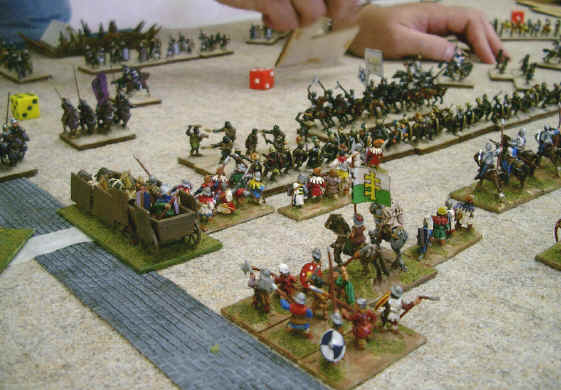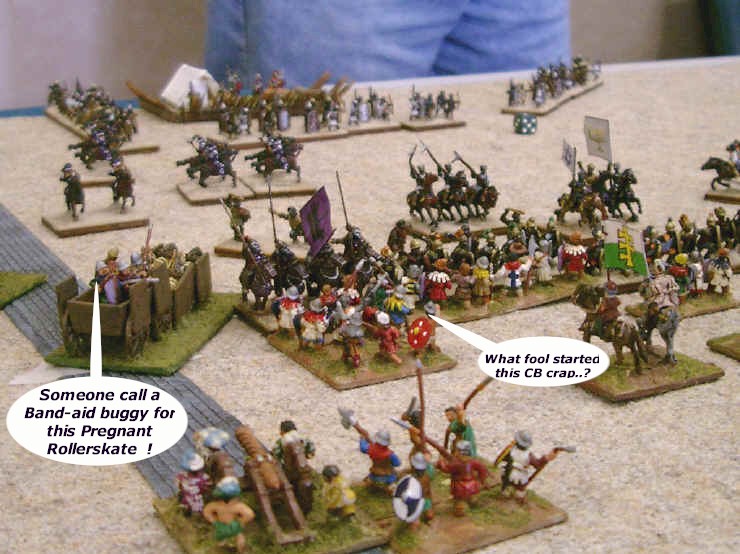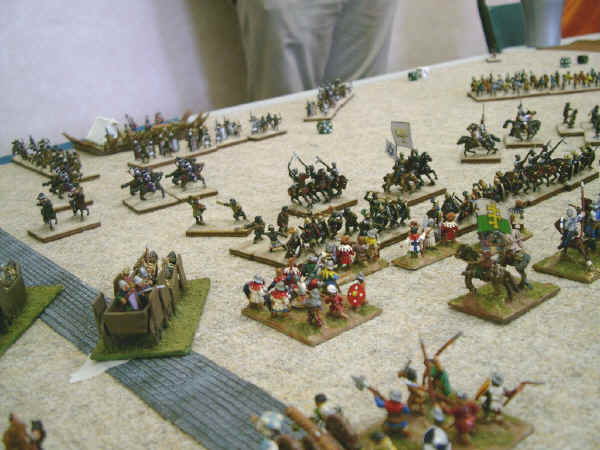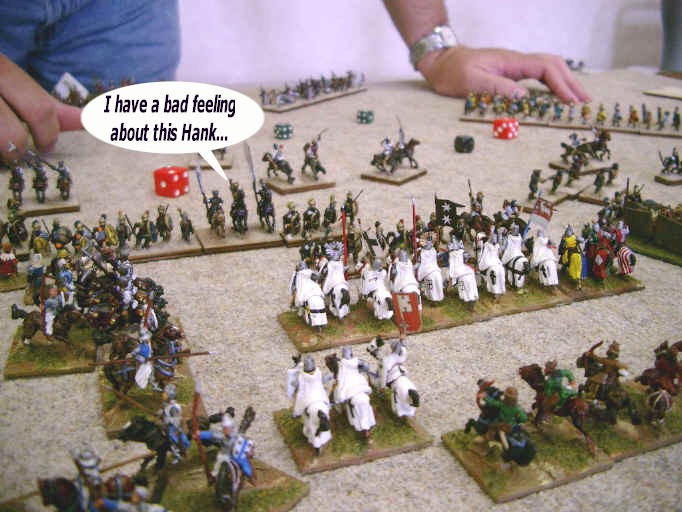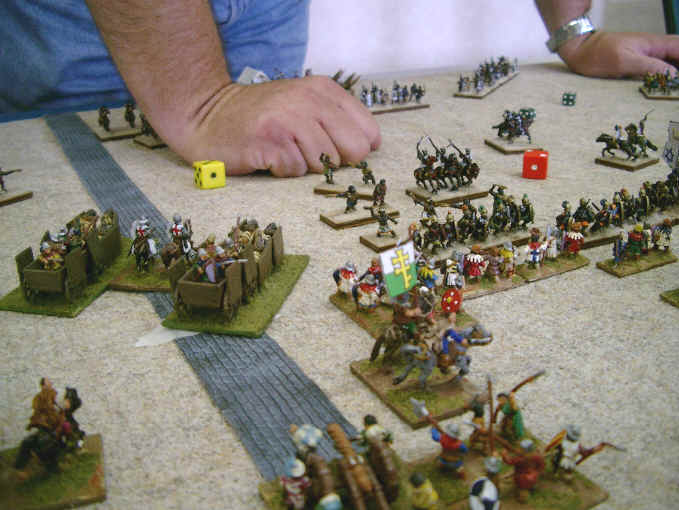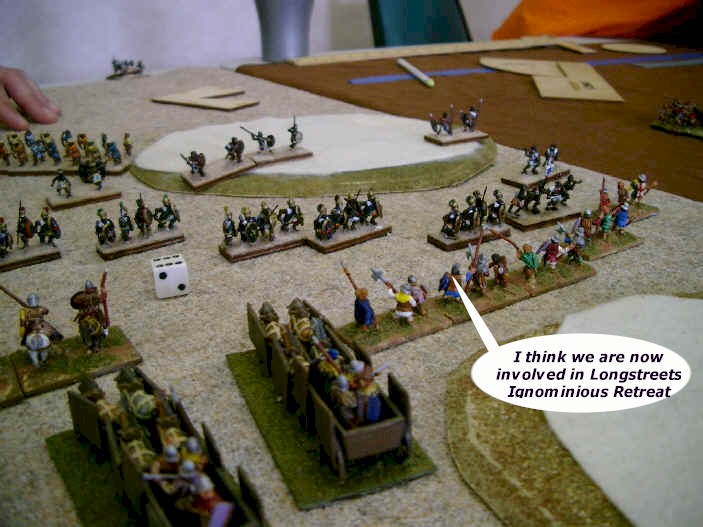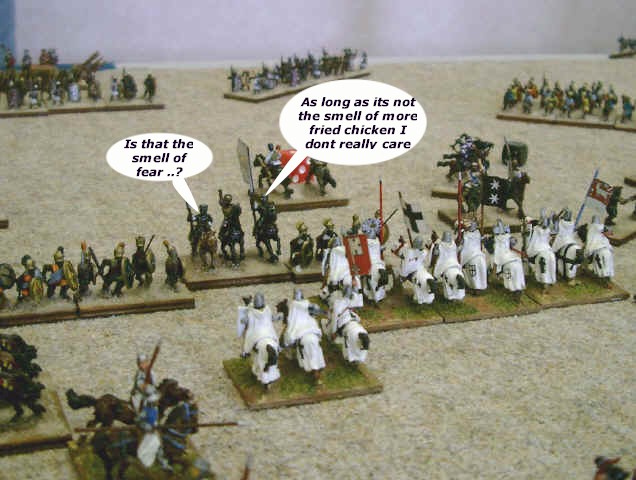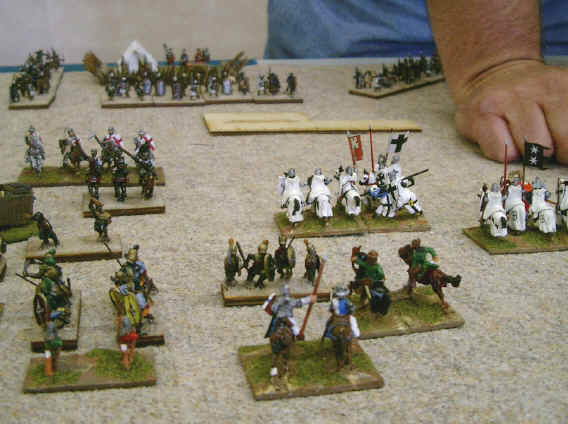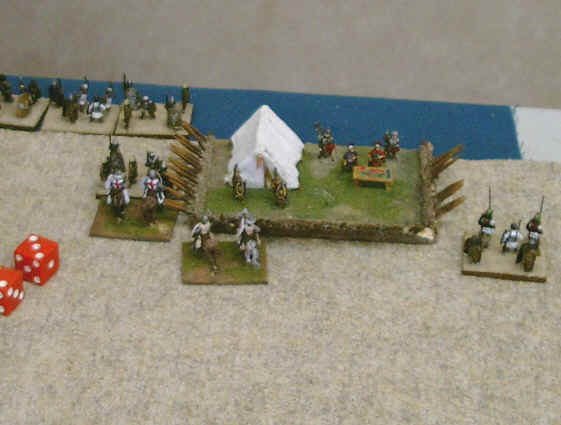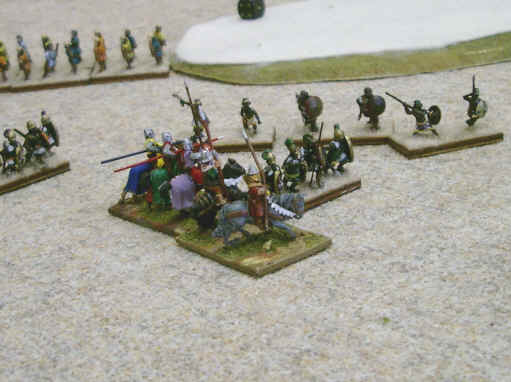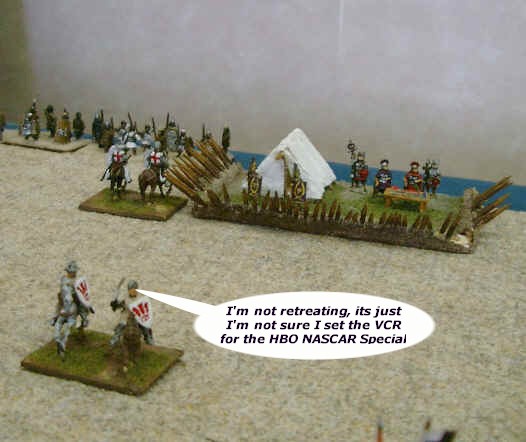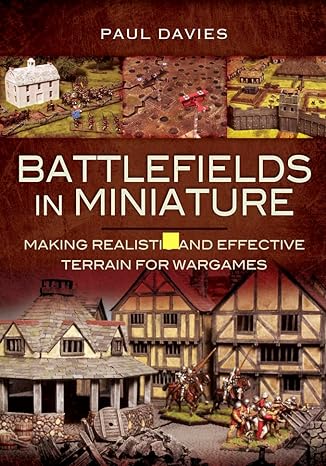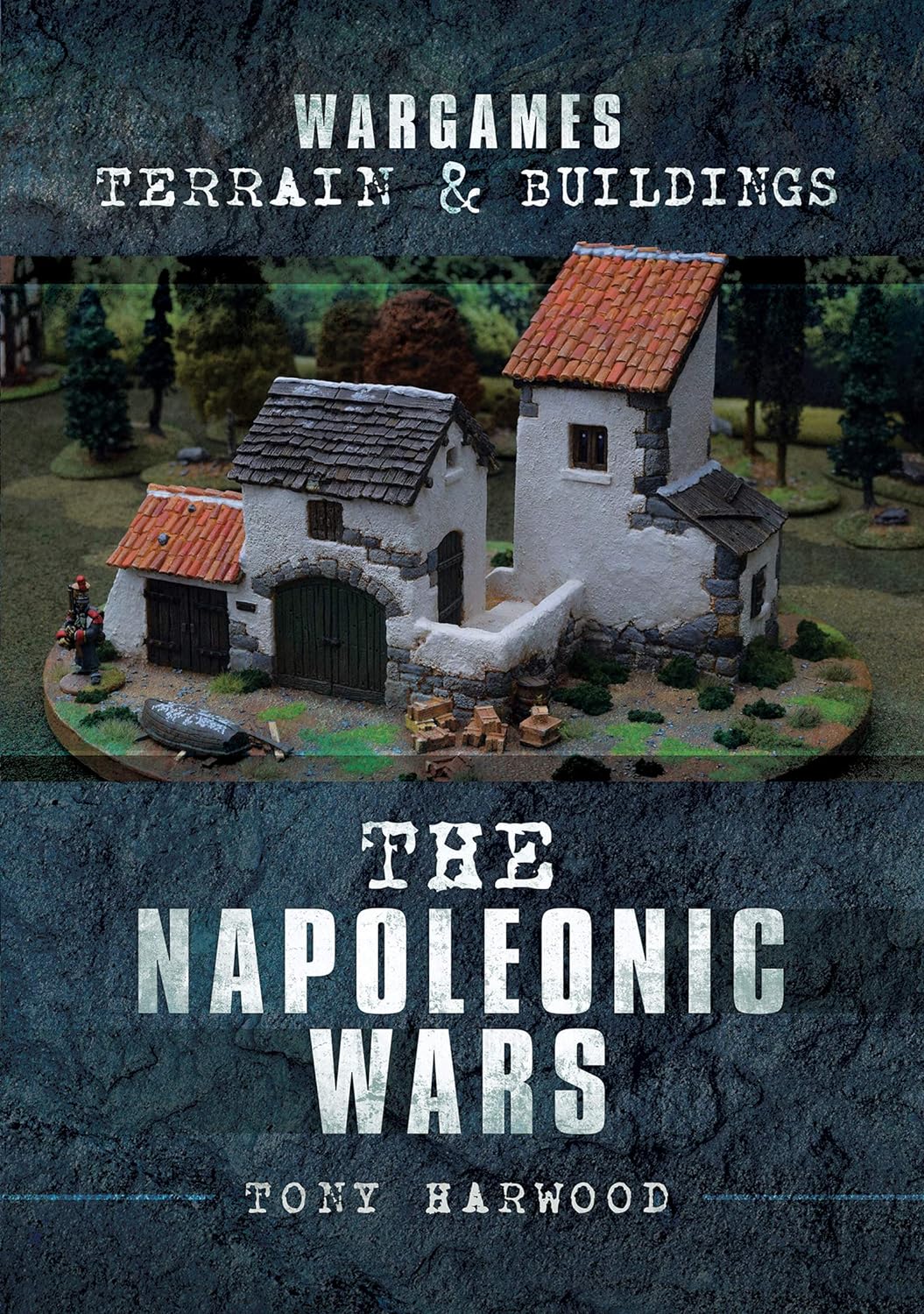Game 4 Birmingham Alabama
Game 4 pitted me against the Later Judeans. I think.
Their army was supported by a Palmyran/Parthian ally consisting of some Kn (X)
The Game Set out like this
This looked like the classic opportunity for me to use Tactic No 1 and rush forwards in a big long line. I also had the road to make amusing super-speed moves down with my wagons if needed, and hopefully I could overwhelm the Judeans before the Parthian Cataphracts swung round in front of my blades.
However, fatigued after their long journey, the Teutons decided this was their time for a short rest, and promptly rolled a 1 for their first pip dice, going unreliable. The lack of the Teutons made me realise how useless the rest of my army was, however I pushed onwards as fast as I could, hoping instead to create some sort of opportunity on my right - the auxilia led by Colonel Pickett, fancied their chances....
Here my massed auxilia were facing a weakly held hill, which if they could take it, would allow them to sweep down on the flank of a Bd (I) and Bw (I) formation.
The Parthians were bemused by the onrushing juggernauts, and frantically tried to work out how to sneak past them unseen under cover of a light horse screen, but devastating fire from the artillery soon put paid to all of that.
On my right the auxilia were grinding forwards under a succession of low pip dice, and soon the flank was acting like a pip magnet for the best dice of the Judeans, as they fought desperately to rearrange their bow and blade formation prior to my arrival.
The Parthian's made a dash for it, but were thwarted by a bold move from a lone wagons, who relied on the Judeans need to throw their best dice at my right in order to keep the auxilia bottled up in the dark brown RGo.
The right was fast developing as the interesting place to be, and a screen of LH sent to pin the blades to prevent them shuffling sideways into my auxilia found itself flanked by light horsemen from the centre command - I lost 2 elements, far too soon.
The auxilia and blades clashed - my troops having got forwards far enough to catch some of the fake Roman swordsmen in the RGo, evening up the odds considerably.
In the middle tow lines of blades were also clashing, as the Parthians had been almost totally squeezed out as they were eroded by shooting. Bd (O) against Bd (I) - it should only go one way, but slowly....
With his nobility already now long dead from withering fire, the Parthian general committed himself to the fray against double ranked flailmen. As he charged in, a cheeky war wagon slipped in behind him .....
... and then he was dead! The Parthian command was broken - although it had been largely impotent for some time already, and was too small to affect the army as a whole.
But the main effect was to galvanize the Teutons, who came back online, and aided by a 5 for their first "real" dice sailed imperiously forward with the rather unsubtle aim of running down anything and everything in their path.
The wagons were now calling in light horse to help them speed up the process of rolling up the Judean lines
But on my right, reeling under the weight of enemy pip dice, my auxilia were being forced backwards. Now the 2 light horse the command had lost early in the encounter started to make things really tricky, as they could not afford to take too many losses.... but after some frantic back pedalling the time and space - and elements - ran out and my flank command was also broken!
Losses for the Teutons were merely something that happened to the enemy, as their frontal opponents evaporated with barely a whimper as the white-clad brethren trampled them without mercy or delay..
Even the Judean CinC couldn't last long in the face of such frightening lance-power, and he too fell in short order..
With only an element or two to go, Lithuanian light horse streamed through the gap where the Parthians had been to attempt to sack the baggage.
as the low-rent Teutonic knight tried to run over Bd (I). Not being proper Brethren, they needed assistance from one of the few survivors from my broken command...
Oh the Infamy of being beaten by baggage!
But in the end it was only postponing the inevitable, and with fences falling all over the park, the Judeans finally capitulated, and the competition ended with a 9-1 victory for the Lithuanians.
Post Match Analysis
The game revolved around the demolition of the Parthian command by the Lithuanian wagons and artillery - the Parthians were simply in the wrong place at the wrong time, and their loss not only removed a dangerous part of the Judeans strike force, it also opened up a hole in their line they were unable to plug. But the real impact was to bring the Teutons online, and an army of Lh and Bd (I) really has no answer to 5 Teutonic Knights - especially in such imperious combat form as they were in this game.
Losing the 2 light horse from my flank command so early in the game - to booze-inspired careless play, combined with pip poverty - meant my ability to trade casualties against the Bd (I) on my right was dramatically reduced, but fortunately once my command broke, the victorious Judeans had no troops capable of moving fast enough to exploit the opportunity, and instead became a series of fragmented targets for my Teutons to seek to mop up to round off the game.
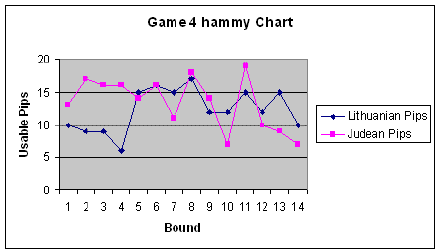
The main Hammy Chart shows the total "useable" pips in each bound, ie excluding the Teutons before they came reliable, and excluding the Parthians once they were totally eliminated in bound 13.
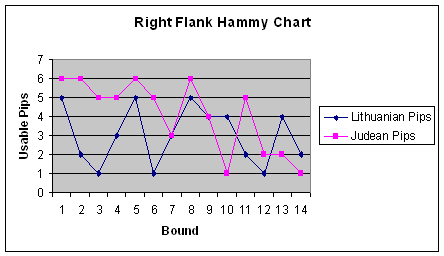
Wheras this detail chart shows only the pips for the commands facing each other on my right - the "Picketts Charge" attempt by my auxilia, showing clearly how the Judeans were able to allocate their dice to redeploy.
Post Match Expert Analysis
The Ancient Army List Index
The Rise of Rome (280 BC to 25 BC) Mid Republican Roman ; Late Republican Roman ; Gallic ; Pyrrhic ; Later Carthaginian ; Ancient Spanish ; Later Macedonian ; Later Seleucid ; Later Ptolemaic ; Attalid Pergamene ; Numidian or early Moorish ; Pontic ; Early Armenian ; Parthian ; Later Jewish ; Illyrian ; Spartacus Slave Revolt ; Bosporan ;
Storm of Arrows - Western Europe in the Later Middle Ages (1300 AD to 1500 AD) Medieval French ; 100-yrs War English (Continental) ; 100-yrs War English (Britain) ; Later Medieval Scots ( Britain) ; Later Medieval Scots (Continental) ; Later Scots Isles & Highlands ; Medieval Welsh ; Later Anglo-Irish ; Medieval Irish ; Low Countries ; Later Medieval German ; Italian Condotta ; Swiss ; Free Company ; Medieval Burgundian ; Medieval Danish ; Medieval Swedish ; Medieval Castilian ; Medieval Crown of Aragon ; Medieval Portugese ; Later Granadine ; Navarrese ; Ordonnance French ; Wars of the Roses English ; Ordonnance Burgundian ; Santa Hermandad Nueva Castilian
Immortal Fire - The Greek, Persian & Macedonian Wars (550 BC - 146 BC)
Classical Greek ;
Early Achaemenid Persian ;
Lydian ;
Thracian ;
Syracusan ;
Early Carthaginian ;
Skythian or Saka ;
Kyrenean Greek ;
Late Dynastic Egyptian ;
Alexandrian Macedonian ;
Later Achaemenid Persian ;
Classical Indian ;
Early Successor ;
Early Sarmatian ;
Galatian ;
Hellenistic Greek ;
Graeco-Bactrian ;
Graeco-Indian ;
Indo-Greek :
Legions Triumphant - Imperial Rome (25 BC to 493 AD) Dominate Roman ; Principate Roman ; Foederate Roman ; Later Sarmatian ; Early German ; Dacian or Carpi ; Ancient British ; Caledonian ; Early Alan ; Jewish Revolt ; Sassanid Persian ; Kushan or Indo-Skythian ; Palmyran ; Early Frankish, Alamanni, Burgundi, Limigantes, Rugian, Suevi or Turcilingi ; Western Hunnic ; Early Visigothic & Early Vandal ; Early Ostrogothic, Herul, Sciri or Taifali ; Early Anglo-Saxon, Bavarian, Frisian, Old Saxon or Thuringian ; Gepid or Early Lombard ; Early Scots Irish ; Early Pictish ; Hephthalite Hunnic ;
Swords & Scimitars - The Crusades (1096 AD to 1311 AD) Early Crusader ; Later Crusader ; Fatimid Egyptian ; Georgian ; Seljuk Turk ; Cuman ; Komnenan Byzantine ; Post Latin Conquest Byzantine ; Ilkhanid Mongol ; Mamluk Egyptian ; Cilician Armenian ; Syrian States ; Khwarazmian ; Ayyubid Egyptian ; Middle Serbian ; Middle Bulgarian ; Medieval Cypriot ; Latin Greece ; Pecheneg ;
Eternal Empire - Eastern Europe and the Rise of the Ottomans (1300 AD to 1500 AD) Early Ottoman Turkish ; Later Ottoman Turkish ; Tatar ; Later Russian ; Later Serbian Empire ; Later Bulgarian ; Later Lithuanian ; Later Polish ; Later Teutonic Knights ; Catalan Company ; Middle Hungarian ; Moldavian or Wallachian ; Albanian ; Timurid, White Sheep Turcoman or Black Sheep Turcoman ; Later Hungarian ; Hussite ;
Decline & Fall - Byzantium and Islam (493 AD to 1071 AD) Early Byzantine; Maurikian Byzantine ; Thematic Byzantine ; Nikephorian Byzantine ; Later Moorish ; Later Visigothic ; African Vandal ; Italian Ostrogothic ; Early South Slav ; Lombard ; Avar ; Arab Conquest ; Early Bulgar ; Ummayad Arab ; Abbasid Arab ; Early North African Dynasties ; Khurasanian Dynasties ; Bedouin Dynasties ; Dailami Dynasties ; Pecheneg ; Ghaznavid ; Western Turkish (includes Khazar);
Wolves From The Sea - The Hairy European Dark Ages Post Roman British ; Early Welsh ; Later Scots Irish ; Merovingian Frankish ; Later Pictish ; Early Slavic ; Middle Anglo Saxon ; Astur Leonese ; Andalusian ; Early Navarrese ; Carolingian Frankish ; Viking ; Magyar ; Great Moravian ; Early Scots ; Rus ; Norse Irish ; Early Medieval French ; Early Medieval German ; Norman ; Early Polish ; Anglo Danish ;
Swifter Than Eagles - The Biblical Book Nubian ; Early Libyan ; Later Sumerian or Akkadian ; Early Nomad Allies ; Old or Middle Kingdom Egyptian ; Hyksos ; Mitanni ; Syro-Canaanite ; New Kingdom Egyptian ; Later Minoan or Early Mycenaean ; Hittite Empire ; ; Middle or Early Neo-Assyrian ; Later Mycenaean or Trojan ; Sea Peoples ; Philistine ; Phoenician Allies ; Neo-Hittite And Aramaean ; Later Hebrew ; Mannaean Allies ; Libyan Egyptian ; Urartian ; Median ; Neo-Elamite ; Proto-Arab Allies ; Cimmerian or Early Skythian ; Neo-Assyrian Empire ; Phrygian Allies ; Kushite Egyptian ; Neo-Babylonian Empire ;
Oaf of Fealty - Early Medieval Europe Feudal Catalan and Early Crown Of Aragon ; Early Hungarian ; Taifa Andalusian ; Feudal Navarrese and Aragonese ; Feudal Castilian Leonese or Portuguese ; Fanatic Berber ; Italo-Norman ; Feudal French ; Imperial German ; Feudal German ; Communal Italian ; Papal Italian ; Early Scots Isles And Highlands ; Feudal Scots ; Early Russian ; Feudal Polish ; Anglo-Norman ; Later Welsh ; Early Lithuanian or Samogitian ; Wendish Prussian or Estonian ; Early Medieval Frisia and Other Free Cantons ; Post-Viking Scandinavian ; Early Plantagenet English ; Later Sicilian ; Early Medieval Irish ; Early Anglo-Irish ; Early Teutonic Knights ; Mongol Invasion ; Early Granadine ; Middle Plantagenet English ;
Empires of The Dragon - China, Korea and Japan Erlitou-Shang Chinese ; Early Northern Barbarian Allies ; Early Zhou Chinese ; Yayoi Japanese ; Early Horse Nomad ; Ko Choson Korean ; Warring States To Western Han Chinese ; Qiang And Di ; Three Kingdoms Korean ; Eastern Han Chinese? ; Three Kingdoms W Jin And S Dynasties Chinese ; Kofun Nara Japanese ; Northern Dynasties Chinese ; Later Hindu North Indian ; Later Hindu South Indian ; Central Asian City States ; Western Wei To Early Tang Chinese ; ; Later Horse Nomad ; Tibetan ; Nepalese Allies ; Parhae Korean ; Late Tang To Five Dynasties Chinese ; Khmer Or Champa ; Thai Allies ; Nanzhao ; Pyu Burmese Allies ; Koryo Korean ; Early Heian Japanese ; Pagan Burmese ; Liao ; Song Chinese ; Xi Xia ; Ghurid Afghan ; Jin ; Late Heian To Muromachi Japanese ; Japanese Warrior Monk Allies ; Mongol Conquest ; Moslem Indian Sultanates ; Medieval Indonesian Or Malay ; Yuan Chinese ; Medieval Burmese ; Ming Chinese ; Yi Korean
Blood and Gold - The Americas Olmec ; Teotihuacan ; West Mexican ; Zapotec or Mixtec ; Toltec ; Chinantec ; Aztec ; Tarascan ; Tlaxcalan Confederacy ; Mayan ; Mochica ; Chanca ; Chimu ; Hatun-Colla ; Canari ; Inca ; Mapuche or Araucanian ; Amazonian Forest Tribes ; Tupi ; Chichimec ; Pueblo Culture ; Mound-Builder Culture ; South-Eastern Woodland Culture ; Timucuan ; Eastern Woodland Culture ; Plains Culture ; Pacific North-West Culture


